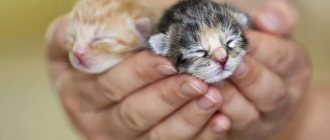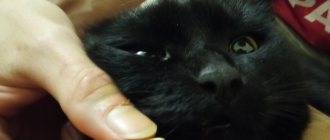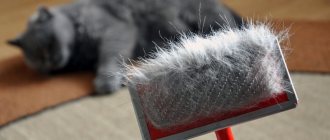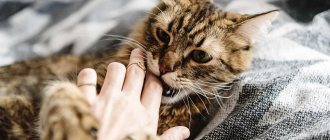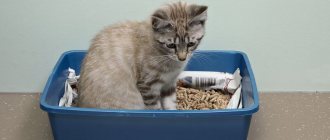Agree that when a pet lives in the house, life takes on more bright colors and becomes more interesting. After all, “our smaller friends” surprise with their behavior, amuse and touch. I would especially like to mention cats, which not only cleanse the apartment of negative energy, but are also able to cure their owners of many ailments. And how nice it is in the evening, after a hard day at work, to retire with your favorite pet and listen to its purring, which acts on the nervous system no worse than an antidepressant. However, before you get a furry pet, you need to create comfortable living conditions for it. We will tell you further about how to keep a cat in an apartment.
What to feed your cat?
When a cat appears in the house, the first question that arises is what to feed the animal? Pet stores have a huge selection of different cat foods, but you can also feed your pet natural food: boiled meat or fish, some vegetables, dairy products, rice and buckwheat. If your choice falls on factory-made food, then you should take into account the age, sterilization of the animal, the activity of the “fluffy” and the presence of certain diseases. For each individual case, you can choose the appropriate food.
Taking care of your cat's ears, eyes, and mouth is a must.
It is recommended to wipe the area around the eyes with a special product or a cotton swab dipped in a small amount of clean water. If there is profuse discharge from the eyes, the cat squints heavily, there is inflammation, or the cat rubs the eyes vigorously, this is a reason to take the animal to the veterinarian.
The cat's ears are wiped with special wipes or slightly damp cotton swabs; it is best to buy a special liquid for cleaning the ears. You should not use ear sticks, or even less make them yourself from available means - careless movement can injure the animal.
Brushing your teeth is an important point. According to statistics, more than 60% of cats suffer from dental and gum diseases to some extent, but only 10% of owners regularly brush their pets’ teeth. It is recommended to clean with special brushes or a regular toothbrush with soft bristles. You should also use a specialized paste; Your cat needs to brush its teeth 1-2 times a week.
It is important to start getting your cat used to brushing its teeth from a very early age, first by simply touching the cat's teeth with your fingers and teaching her not to bite, then gradually moving on to brushing and always using some kind of treat (for example, wet food) for reward.
Special foods have also been developed to clean teeth, for example, Purina® PRO PLAN® Cat Dental Plus®, with a special granule texture and substances that reduce the formation of tartar.
What vitamins and vaccinations do cats need?
Cats that live permanently in an apartment need vitamin supplements, which can be purchased at veterinary pharmacies. You can also plant special grass for cats on the windowsill, which they will enjoy feasting on and saturate the body with essential vitamins. And do not forget to regularly visit the veterinarian, who will vaccinate the animal against rabies and viruses.
When to pay attention to health
It is recommended to regularly show a domestic cat to a veterinarian for preventive examination and vaccination, even in the absence of obvious signs of disease. Cats can suffer from a variety of diseases: kidney, bone, gastrointestinal, heart, and they can also experience injuries. There are a number of symptoms that require immediate medical attention:
- decreased activity and loss of appetite;
- repeated vomiting or diarrhea;
- temperature increase;
- the presence of mucus or blood in the urine and feces;
- copious amounts of saliva;
- Excessive discharge from the eyes and nose.
A balanced diet consisting of high-quality, preferably natural food and vitamin supplements is of great importance for a cat’s health.
Recommended Posts
Standard height and weight of the Cane Corso breed by month
Weight of a puppy and an adult Labrador by month
Weight and height of a German Shepherd puppy by month
Description and content of the hunting border terrier
Description and care of the highly intelligent Border Collie breed
Description of forms and features of treatment of enteritis in cats
Toilet issue
As a rule, the cat chooses a latrine for itself, where it can later be placed with a litter tray. The tray should have low edges, into which a special filler is placed (with the smell of wood, sand, etc.). For adult cats, a tray with high sides is suitable so that the contents do not scatter around the apartment.
How to carry out treatment at home?
Treating your cat at home is not a simple matter and requires detailed discussion. On the one hand, the diagnosis of most diseases, and even more so their adequate treatment, necessarily requires the participation of a veterinarian. On the other hand, timely assistance to your cat in case of accidents, as well as mandatory attention to the first manifestations of any diseases in cats, is the main concern of the owner.
So here are some useful tips.
Pay close attention to your cat's overall health. Only indirect signs can indicate that a cat is sick, for example: a change in body temperature (normally from 38 to 39 C), decreased appetite, apathy, and decreased social activity.
Burns
Try to calm your pet and carefully examine the burn area. Treat the affected area of skin with dexpanthenol spray and try to bandage it. Do not allow your cat to lick the burned area and avoid contact of the affected skin with dirty surfaces. After treating a burn, contact your veterinarian immediately.
Cuts
When you get a cut, first inspect the wound. If it is shallow and does not bleed much, treat it with an antiseptic solution (hydrogen peroxide, chlorhexidine), bandage it if possible and consult a veterinarian. But remember that you should not use iodine, brilliant green and other alcohol-containing solutions to treat wounds - they can cause a burn to the wound and aggravate the situation. If you find heavy bleeding, apply a tight bandage and immediately take your cat to the veterinary clinic!
Fractures
Falling from a height of one or two people's own height - the most common cause of fractures in humans - practically does not harm cats. In an apartment, it is difficult for a healthy cat to break anything. Most often, such injuries are the result of limbs being pinched by doors due to the carelessness of the owners.
If your cat is limping, do not try to apply a bandage yourself - without proper pain relief, you will only do harm. If the injury is accompanied by damage to the skin, treat the wound as indicated above. After this, you should limit the cat’s mobility as much as possible, put it in a carrier, and contact a veterinary clinic as soon as possible.
Poisoning
Often, domestic cats can accidentally swallow inedible and even life-threatening chemicals, for example, some household chemicals. Symptoms of poisoning: apathy, lethargy, decreased temperature, repeated vomiting, diarrhea. Try to give your pet some kind of sorbent drug (for example, activated carbon), and contact your veterinarian as soon as possible.
Never try to diagnose and treat your cat’s illnesses yourself! For any serious illness, after first aid, contact a veterinarian you trust.
Place for the cat to rest and sleep
As with the toilet, the cat also chooses its own place to sleep. Moreover, she may have several places in the apartment for relaxation. Cats love cozy pillows and baskets to rest on. If she chose another place for herself, then simply put the bedding there. And don’t be surprised: cats can sleep on cabinets and mezzanines, on the TV and on kitchen drawers. You can also purchase a special house for your pet.
Features of keeping a cat in an apartment
Keeping a cat in a city apartment begins with accustoming it to routine and order. First of all, feeding, playing and resting at a certain time allows you to form a rhythm of life in your pet that is as close as possible to the rhythm of life of the inhabitants of the apartment. It is very convenient when the kitten sleeps at night and does not run around the entire apartment or demand food.
Keeping a cat in a city apartment leaves a special imprint on cat play. Usually kittens are very responsive to playing with them; in play they satisfy their biological activity, and the owner’s task is to teach them safe and useful games. During the game, the basic habits of the future adult animal are formed.
Keeping a cat at home requires attentiveness on the part of the owner. If you don't want to have furniture scratched with cat claws, you need to equip a scratching post. This is not difficult - just fix a piece of carpet in a place accessible to the cat or purchase a special scratching post in the store. You need to play a little with the animal on the scratching post using a laser pointer, a piece of string or a special mouse for cats. The first few times, holding on to the carpet with its claws, the cat remembers how comfortable it is to sharpen its claws. These animals are very intelligent, so keeping a cat in a city apartment evokes a lot of positive emotions in people.
Cats love to be petted, so use it to your advantage. For example, teach your cat to brush itself, which is especially important for long-haired cats. Protect your pet from accidentally falling outside the window! For this purpose, the windows are equipped with a special limiter when opening in ventilation mode, as well as a special mesh designed for cat claws.
How to organize leisure time for a cat?
To make friends with a cat, you need to pay enough attention to it. Therefore, try to devote at least 20 minutes a day to playing with your pet. For games, you can purchase animal toys, rattling balls or a wind-up mouse. Cats really like the light from a laser pointer. Remember that an animal is very sad without its owner, so if you are at work all day, it is better to get two pets at once, which will be much more fun together.
How to toilet train a kitten?
Cats at home behave like very clean animals. They regularly clean themselves by licking their fur and “washing”, and also keep their toilet clean. Usually, toilet training in one place does not cause difficulties, even for novice owners. Adult animals usually independently train their kittens to use the toilet in a certain place.
If for some reason the kittens did not learn this from the cat, they can easily learn to use the toilet during the first days of being in their new home. At first, it is enough to place the litter tray in close proximity to the place where it is located, and place the kitten in the tray several times a day, mainly after feeding. For this purpose, trays of various shapes and sizes are used; they can be with or without a grid. It is very convenient to use cat litter, the choice of which is huge. When using the litter, keeping your pet at home becomes even easier.
All healthy cats are clean at home. If there are problems with cleanliness in cats, then first of all, it is necessary to exclude the disease of the pet. This may be due, for example, to kidney or bladder diseases - only a doctor can make a diagnosis. If the pet’s health is fine, it is necessary to solve the problem of keeping the cat at home. a zoopsychologist/felinologist can help with this
Cat care
To keep your pet healthy and beautiful, you should care for it using the following procedures:
- Bathing once every 2-3 months or as needed when it gets dirty.
- Brushing, which cats really like and allows them to keep their fur in a well-groomed condition.
- Nail trimming, especially if there are small children in the house. This “event” should be held once every two weeks.
- Ear cleaning is carried out for prevention as they become dirty.
And finally: ensure the safety of your pet and clean regularly so that your cat does not inadvertently swallow a small part that suddenly ends up on the floor. Open windows are another danger for cats, so keep an eye out for this.
We hope that our advice will be useful to you, and that your life together with your cat will be fun and hassle-free.
Domestic cats also often undergo nail trimming.
It is necessary to accustom your pet to trimming its claws from a young age, gradually introducing it to this procedure, at first only by touching its claws during communication, then gradually adding a nail clipper or blister. If your animal has not been accustomed to the procedure of trimming its claws since childhood, then trimming its claws will be quite difficult, and almost impossible for one person, without putting the pet into a stressful state and without injuring the pet. In this case, the best solution would be to contact a veterinary clinic or grooming salon.
If you do do this yourself, make sure the cat is in a supportive mood, pet it, then gently restrain the animal with the help of an assistant and, pressing on the pad of the paw, expose the claws. Using special safety pliers or blisters (available in pet stores), trim the claws. Do not cut too short; you must leave a few millimeters to the “living” claw. Do not use blunt instruments or regular nail scissors. At the end of circumcision, the claw is processed with a nail file at the cut site.
Punishment for breaking the rules
The amounts of fines if an administrative case is opened regarding a particular incident are as follows.
- According to the law, the owner of an animal that damages the property of a neighbor or passer-by will pay a fine of 4-5 thousand rubles.
- If a dog is left in an unauthorized place (in particular, in a public place) for a long period of time, the owner faces a fine of 1-2 thousand rubles.
- For cruelty to an animal, if the offender is caught red-handed, the fine can be even more than 300,000 rubles.
In cases where there has been a mass extermination of (several or more) domestic or stray animals, the danger of which to surrounding people has not been proven, the Code of Administrative Offenses of Russia does not apply. Such a technique is considered an excess of self-defense, so a criminal article on acts of cruelty towards animals can be applied. In this case, by a court decision, the violator is sent to free public works and is fined or sentenced to a certain term of imprisonment (suspended or real).
Difficulties of maintenance
Pets love to sharpen their nails and often damage furniture if they want to sharpen their nails.
To avoid damage, invest in a nail sharpener.
Leave marks
To eliminate the unpleasant smell of marks, go up to your pet, grab him by the withers and growl at him, if he starts waving his paws, lightly spank him to show him who is boss in the family.
Then spray the marker with alcohol to show that the area belongs to you.
Don't go to the litter box
Your cat may refuse to go to the litter box if she feels uncomfortable or doesn't like the litter.
Adviсe:
- Rearrange the toilet until you feel comfortable;
- Find the right size for your cat;
- Keep the toilet clean at all times.
By following these simple rules, you can train your pet to use the toilet.
Nutrition rules
Feed a high quality, well-balanced food that keeps him full and active. For variety, feed dry and wet food alternately.
Don't eat wet food at all:
- Milk;
- fish;
- other products that the owner consumes.
The most important thing is to constantly change the water in the bowl; it is better if the cat drinks filtered water.
Never mix dry and wet food of the same or different brands, as this can cause gastrointestinal problems.
Castration of cats
Veterinarian tips for caring for cats:
- Veterinarians advise castrating an animal at 9-10 months. If castrated earlier, the animal may develop problems with the urethra. It is necessary to castrate before the first mating.
- If you operate on the cat later, it will not help; after the operation, he will still want the cat. Because the sex hormone in cats is also produced by the pituitary gland and, if mating has already taken place, then the sex hormone will not escape from the cat’s body.
- After the operation, take good care of the cat, do not let him lick the stitch, put on a special circle so that he does not reach it. Let him drink more regular fresh water.
- Feed him food that is easy to digest; heavy food after surgery and lack of water in the cat's body can cause urolithiasis and obesity. Such procedures are done at the request of the animal’s owners; if you want offspring, you don’t have to do it.
Not only dogs are man's best friend, but cats too.
What to do if you have allergies
It is not necessary to give up your pet unless the allergies are too severe.
- Keep your cat out of your bedroom and buy hypoallergenic bedding.
- Buy an air purifier with quality filters.
- Use an anti-allergen indoor spray.
- Avoid carpets, heavy curtains and furniture with fabric upholstery.
- Clean your home often. It’s even better if someone else does the cleaning so that you don’t inhale dust that contains allergens.
- Consult your doctor about appropriate medications.
What are the rules and laws regarding keeping pets in 2021?
When living in an apartment building, you have to take into account not only your neighbors, but also their legal rights. For example, anyone can have a pet, which is not against the law, but often creates inconvenience for people around them. We will tell you what rules and laws regarding keeping pets in an apartment building exist in 2021.
The main rule of living in an apartment building is to use the living space for its intended purpose. At the same time, it is prohibited to violate sanitary standards and the legitimate interests of other citizens. If your neighbor's dog endlessly barks or shits under your door, this is a violation. To stop such things, it is often necessary to enter into conflict with your neighbors.
Laws governing the keeping of animals
Issues related to the regulation of the residence of pets and their maintenance are not fully regulated by current legislation. This often leads to conflict situations between neighbors living in apartment buildings.
Among the regulatory legal acts, the following documents can be distinguished:
- Decree of the Government of the Russian Federation of January 21, 2006 No. 25 “On approval of the Rules for the use of residential premises”;
- Federal Law No. 52 of March 30, 1999 “On the sanitary and epidemiological welfare of the population”;
- Law of the Russian Federation No. 4979-1 of May 14, 1993 “On Veterinary Medicine”.
Main nuances of keeping a cat in an apartment
If you decide to get a cat, you will have to set a whole series of rules for yourself and your family. If you live on the second floor or higher, always make sure that the windows do not remain open - the cat may fall. If you don’t want to deprive yourself of fresh air, install a special one. metal mesh. It is important to note that the mosquito net is completely unsuitable for such purposes - it may not withstand the weight of the cat and fall out along with the animal.
The rules of behavior for responsible owners should apply to all family members, regardless of their age - it is very important to convey them to children in a timely manner. Whatever the breed of cat, care and maintenance for it are the key to health and friendly character. Regular brushing, regular and nutritious nutrition, eye and ear hygiene, teeth brushing, and other nuances are important to observe for all family members.
Eating plants and grass is a separate point that requires a lot of attention from the owners. It is important to know that some house plants are toxic and poisonous to cats. To protect indoor plants from your pet, plant cat grass in the container. You can buy it at any pet store. This will not only preserve other plants, but will also protect the animal from poisoning by indoor flowers. In addition, special cat grass stimulates digestion.
If you have a kitten or kittens in your home, it is important to take care of the safety of your pets. Curious animals in the process of playing can climb somewhere, get stuck, or inadvertently injure themselves. Just screens on the windows are not enough here. It is worth thinking about setting up a fenced enclosure for walking on the street or right in one of the rooms. It will allow kittens to play to their heart's content without causing damage to your apartment.
There is an exploratory spirit in every member of the cat family, and suppressing natural instincts is a difficult task. Don’t scold your cat’s desire to examine every centimeter of your home, because she is the owner and should know it inside and out. Domestic cats have a special attachment to their place of residence. Therefore, it is extremely important that the cat in the house has the opportunity to control its territory.
Governing laws
In Russia, keeping pets is regulated by the following terms and conditions, which are in force on the basis of decrees and regulations at the federal level.
Federal Law of December 27, 2018 No. 498-FZ “On the responsible treatment of animals and on amendments to certain legislative acts of the Russian Federation.” The law is at the stage of consideration and approval and will finally come into force by 2021.
Resolution of the Moscow Government of February 8, 1994 No. 101 “On approval of the “temporary rules for keeping dogs and cats in Moscow” and “temporary regulations for the capture and maintenance of stray dogs and cats in Moscow.”
- Federal Law No. 4979 “On Veterinary Medicine”, adopted on May 14, 1993.
No laws or bills have yet prescribed precise amendments for the types of animals domesticated as domestic animals. In other words, you can keep both a cat and a hedgehog.
Purchase from a nursery
You have decided to buy a cat, then buy it from a nursery, so you will be sure that you will receive a purebred animal, with all the accompanying documents and vaccinations.
With proper breeding, the animal will be healthy, and the owner will receive the pet of his dreams.
According to Russian law, when purchasing, it is necessary to conclude a purchase and sale agreement so that each party can guarantee its integrity.
Escape from home
A domestic cat without experience of orientation and survival in natural conditions, suddenly finding itself on the street, can get into trouble. Under the influence of strong stress, the animal may get lost and not find its way home.
If, at the time of escape, the cat encounters another animal or an aggressive person, it may hide in some corner or basement, or climb a tree. Often, this ends with sad consequences, because it is very difficult to help a cat with a frightened animal. They do not make contact, do not allow themselves to be pulled together, for example, to remove them from a tree, they can bite and scratch a person.

